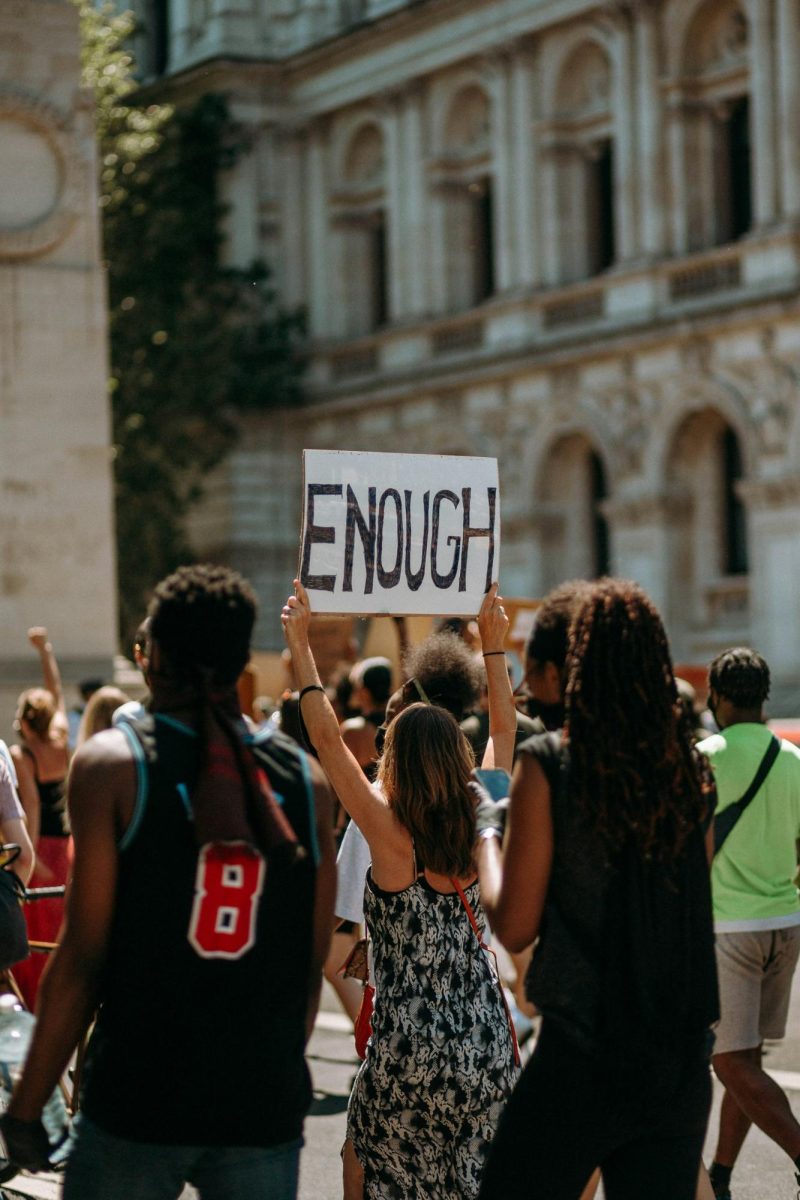The consumption of a product or service tells businesses a lot about what consumers want. Similarly, the lack of consumption of a product or service tells businesses a lot about what consumers do not want. Lack of consumption translates to low profit, which is antithetical to what any proper business wants. To fix this, businesses will make changes to meet consumer’s wants; this is the kind of logic that drives a boycott.
According to Merriam-Webster Dictionary, to boycott something is to, “-engage in a concerted refusal to have dealings with (a person, a store, an organization, etc.) usually to express disapproval or to force acceptance of certain conditions.” Boycotts are different from labor strikes in that they involve the average consumer/civilian taking a stand rather than an employee from the offending party. The topic of boycotting has become even more relevant in recent months due to the still ongoing Israel-Palestine conflict.
While the issue at the heart of this conflict goes back a long time, eyes from around the world have been stuck on Gaza since this past October. In that time, Stetson University has held a couple of on-campus cultural-credit events discussing the situation such as flash panels and Dr. Paul Croce’s Values Day Workshop. The controversial conflict has spurred reactions from almost all corners of the world, with a good number of them passionately crying for a ceasefire. In a poll done by Reuters/Ipsos in November of last year, it revealed that 68% of Americans want a ceasefire. Many from this percentage have been prompted into protesting but are also boycotting companies with ties to or have shown support for Israel. This, of course, sees them not buying anything from the company and encouraging others to do the same. Among the targets for these boycotts are Starbucks and McDonalds. The former came under fire as a result of the company trying to distance itself from a Pro-Palestine post made by a union of its workers, Starbucks Workers United, and putting out the statement: “We unequivocally condemn these acts of terrorism, hate and violence, and disagree with the statements and views expressed by Workers United and its members.” McDonald’s started to face scrutiny after its franchise in Israel announced that they were handing out free food to the Israeli military; it should be noted that McDonald’s in Israel are managed by local owners and operators. The purpose behind boycotting these Israel-associated companies is to hurt them financially enough to cut ties with Israel in the conflict and to see less harm come to Palestinian civilians caught up in the crossfire.
A Short Overview of Boycotts in America:
Despite the Irish origin of this phenomenon’s coinage, boycotts have also been featured in the annals of American history. During the American Revolution, boycotting was a favored resistance method amongst colonists against Britain’s policies and taxation laws. Another boycott of great significance in American history was the Montgomery Bus Boycott. Sparked by the arrest of Rosa Parks after she refused to give up her bus seat to a white person, the boycott was aimed at desegregating buses in Montgomery, Alabama. The boycott was successful as it led to the U.S. Supreme Court to declare that the city’s segregation laws were unconstitutional and helped to establish the foundation for the Civil Rights Movement.
Dr. John Carrick, Associate Professor of Management at Stetson University, gives us a more recent example in history. “Nike, over the years, has faced several boycotts,” Dr. Carrick explained. “They’ve gotten better in recent years, but especially in the 90s to early 2000s. They got in trouble for their contract manufacturers using child labor. The vast majority of Nike’s manufacture is done by contract manufacturers. Well, it came to be that a lot of these contract manufacturers were doing things they absolutely should not have done, most notably using child labor.”
Boycotting in The Age of Streaming and Social Media:
With the internet came two technological inventions that helped to shift the way boycotts are done. Those inventions are none other than social media and streaming.
Social media platforms like Tumblr, Twitter and Instagram allow people from all over the world to connect with each other. People are able to more effectively organize their efforts, grow their numbers and are also able to pass on valuable information to their fellow activists. Because of social media, boycotting has become a much more streamlined experience with many boycotts originating on social media. For example, Bud Light was targeted by a conservative boycott for collaborating with transgender TikTok star Dylan Mulvaney for a social media marketing campaign.
Streaming platforms like Netflix and Hulu provide consumers with access to content and the freedom to consume it anytime. Conversely, consumers also have the freedom not to engage with a piece of media on a streaming platform. Unlike the television or radio where viewers had to follow a set schedule, streaming offers flexibility that enables users to support one piece of content media over another.
Thanks to streaming, there has been more awareness amongst consumers about the impact of their consumption. This is best seen with music industry fans, especially within the context of stan culture. These fans, who want to see their favorite artist succeed, come to know that consuming an artist’s work on streaming platforms translates towards that artist’s success in the music industry. As a result, devoted fans take a zealous approach to streaming their fave’s music. Boycotting, in this context, sees music fans take the inverse approach where they stop streaming an artist’s music as a means to hold them accountable when the artist is found to have done something that is deemed to be offensive and unacceptable. For example, in 2020, Canadian rapper Tory Lanez saw a 40% drop in streams as a result of listeners boycotting him after Houston rapper Megan Thee Stallion confirmed that he shot her in the foot.
Awareness about the impact of consumption influences what pieces of media a streamer chooses to consume and what they choose to boycott. An example of where this comes to be in association with social media is the Noah Schnapp situation. In the days following the October 7th attacks and start of the Israel-Palestine conflict, the 19-year-old Stranger Things actor expressed sorrow for the loss in life in Israel and support for the country. However, he faced criticism that later intensified when he posted a video of himself laughing with friends, handing out stickers saying ‘Zionism is Sexy’ and ‘Hamas is ISIS’.
Following Schnapp’s actions, there was and continues to be earnest talk online amongst viewers and fans of Stranger Things about potentially boycotting the long-awaited final season of the show. This comes after its much talked about and record-breaking fourth season. The talk was so evident that it seemed to spur Schnapp into addressing the entire situation in a video posted to social media. “I only want peace and safety and security for all innocent people affected by this conflict,” he spoke in the video. Noticeably, this video was posted around the time that the final season of Stranger Things was beginning production.
A Business Attitude about Boycotts:
Businesses can feel the impact of boycotts. This can be seen in a letter posted to LinkedIn by Mcdonald’s CEO Chris Kempznski where he commented on the Israel-Palestine conflict, the boycotts and how the boycotts are impacting the business. He wrote: “Our hearts remain with the communities and families impacted by the war in the Middle East. We abhor violence of any kind and firmly stand against hate speech, and we will always proudly open our doors to everyone.” In that same letter, he also wrote: “I also recognize that several markets in the Middle East and some outside the region are experiencing a meaningful business impact due to the war and associated misinformation that is affecting brands like McDonald’s.”
We can get a more in-depth perspective from Dr. Carrick. “That’s never a good thing for business to be a target of a boycott,” said Dr. Carrick, “More than that, they’re going to have to use resources to deal with it, and those resources could presumably be used elsewhere for more effective purposes.”
Among those resources that a company uses are marketing and public relations. “The biggest amount for them and for most companies is the marketing and PR. There’s also indirect costs, most notably the time of key people. So, anytime there’s a boycott of significance and it’s having a decent impact on a company, the CEO, the CMO, executives and managers are going to have to spend a lot of time on that and that’s not productive time,” Dr. Carrick explains.
Explaining what steps needed to be taken by a company being boycotted, Dr. Carrick said “If they are the target of a boycott, they need to address the underlying issue, they need to understand what the issue is, they need to understand why the issue is there.” He went on to say, “And then, they need to understand what percentage of their customers who are part of the boycott. Because oftentimes, with a boycott, it’ll be a small group. And if that’s the case, you can’t make everyone happy.” Dr. Carrick continued to highlight the significance of the number of customers boycotting when it comes to the effectiveness of a boycott: “It’s not that they want to ignore the boycott. But they’re probably not going to put the effort into it that they would, let’s say, if 60% of their customers supported the boycott.”
So what if a company refuses to listen in face of massive boycotts and continues to stick to their guns? “So if that’s the case, then they have to understand what the potential ramifications are, in terms, okay, we might lose a certain percentage of business,” Dr. Carrick explained. “They need to clearly communicate with all their stakeholders. So they need to make sure they communicate with all their stakeholders why they’re staying the course, why it makes the most sense for them, and then it has to go back to some rationale. And usually, that rationale needs to be linked back to the company’s values and terms of why they’re justifying not making any changes.”
Anti-Boycott Laws and Their Implications:
Boycotts have been shown to be inherently political expressions that have helped craft the United States of America into what it is today. This makes the existence of antiboycott laws so strange. These laws exist to prevent participation in foreign boycotts that the United States government doesn’t support. One of those foreign boycotts is the Boycotts, Divestment, and Sanctions (BDS) movement, a global movement formed by Palestinians to pressure Israel to follow international law in its conduct with Palestine. This movement, which these ongoing Pro-Palestine boycotts are a part of, faces heavy opposition from Israel and its allies with them accusing the movement of antisemitism. The movement is so opposed that there are Anti-BDS laws– laws that restrict boycotting Israel and that are specifically aimed at opposing the movement. Rather these laws work to forbid American businesses and individuals who have business contracts with state governments from boycotting Israel or refusing to do business with or in Israel. There are U.S. states, such as Arkansas and California, that have passed antiboycott laws. But there have been cases where such laws have been blocked in federal court due to being found in violation of the First Amendment.
No matter what side a person takes with the Israel-Palestine conflict, the heart of the matter is that these anti-boycott laws carry heavy implications for future boycotts. Critics of antiboycott laws point out that it has the potential to set a dangerous precedent in limitations of public speech and claim that it has inspired the legislation of other antiboycott laws regarding other issues. Among these alleged anti-BDS inspired laws is a law that was passed in June of last year by the state of Alabama that prohibits the state from making business contracts with companies if they don’t submit a written certification confirming that they do not boycott another company over it failing to provide gender-affirming care or reproductive health benefits. Boycotting, as shown with the Montgomery Bus boycotts, has the ability to allow marginalized groups of people to access political capital, and stand against oppressive institutions. This type of empowerment is significant and is rare for many to access through anything else. Having such empowerment be restricted takes away the opportunity for the common man to challenge the status quo.
It is radical because we are living in a time where there are so many different ways to consume. Netflix, Instagram, Uber and Amazon are just a few ways to show how consumption is at our mere fingertips. It is radical because boycotting takes the purchasing power of average citizens into potent political power. Boycotting asks us as consumers to take responsibility for our consumption habits and the effects that it has on our society.
Side Piece:
It is not uncommon for boycotters to take their business elsewhere when boycotting. You could look to local businesses in your town to buy desired products. For instance, if you were a Stetson student who usually got their fix of Japanese mochi from Amazon and then started to boycott it, you could get your mochi from the local oriental store in Downtown DeLand. In this way, you’re not only depriving your target from making a profit off you, you’re also contributing to the local economy of your community.









